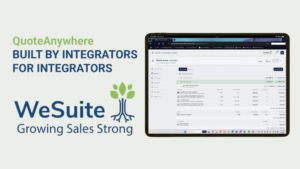Four Ways Your Sales Process Defines Company Growth & Profitability
Can you really survive with a manual, de-centralized, sales process? We’ve got 4 ways your sales process defines company growth and profitability…read more

By Tracy Larson
In business, we talk A LOT about results; they’re how we measure success. KPIs measure performance against a wide range of metrics, and employees are rewarded based on the outcomes.
Results are important, but if you want to grow your company, they’re not the only thing that matters. You also need to focus on workflow processes. We all care tremendously about the bottom line. However, without the right established processes in place to get us to the desired outcomes, it’s hard to build on success. Your company might have a record-breaking year for sales, but if you don’t have the technology in place that defines successful processes in support of sales, how do you do it again and again? Conversely, if KPIs aren’t hitting the mark, how do you accurately identify what to change?
Sales management software forces companies to define and improve their sales workflow and processes, resulting in greater efficiencies and accuracy not only in sales but, throughout the organization. The bi-products are increased profitability and an easy path for growth.
Here are 4 ways your sales software defines processes for growth and profitability:
- Defined Sales Workflow: Salespeople don’t want to spin their wheels, or reinvent the wheel, each time they tackle a new lead or estimate. When sales process is not in place, your company will hit a wall where inefficiencies, manual processes, and resulting mistakes prohibit growth and profitability. Everyone is doing “their own thing”. They aren’t sure about the Excel pricing data, they don’t know where the latest proposal version is stored, if the right “Ts and Cs” are there so, they take matters into their own hands. Defined, cohesive sales workflows backed by technology driven tools provide structure and guidance of how things are done. When Sales has the tools and resources to move from step A to B to C with greater accuracy, efficiency, and a repeatable process, that closes the organizational gaps that hinder growth and profitability, and gives selling time back to salespeople. Ideally, defined technology driven processes balance management’s need for control and implementation of best-practices, with sales team members’ desire to approach their jobs with creativity and independence. Sales can sell the right products and services, at the right pricing to prospects and customers. Defined sales workflows also make onboarding and training new talent a whole lot easier. Without them, new employees can feel like they’re being asked to pilot a plane without flying lessons.
- Centralizing Data and Removing Silos: Think of your sales organization like a football team. What if, before each down, the team broke into three different huddles and decided, separately from each other, how to execute the play? You think there would be many touchdowns? Everyone on you sales team needs to be in the same huddle, utilizing centralized data, and developing winning “plays” together.
Decentralized data is the enemy of a well-designed sales and delivery process. Sales management software provides a centralized database that, creates the continuity your team needs for executing consistent, repeatable, effective processes the first time.
- Eliminating Bottlenecks: Certain processes seem ideal in theory but, filled with manual bottlenecks when put to the test. For example, estimate reviews and approvals are an important step toward ensuring incorrect quotes don’t go out the door. However, when every quote must wait for manual review and sign-off, a log jam is inevitable, and many will go out without review. As salespeople wait for approvals, they can lose their competitive edge. Another more efficient company may swoop in and win the project before your quote is presented.
Sales management software solves this problem. If quotes fit within pre-established parameters, they are automatically approved. Only those that exceed specific thresholds must be reviewed. Managers are notified automatically when an approval is required, and with fewer in the queue, reviews happen with less delay, are focused on the highest risk sales, and include an automated audit trail. This is just one great example of how workflow automation helps processes deliver their intended results.
- Picking Up the Pace: Centralized data and automated workflows move projects along, helping to estimate and close faster, and more often. Automated generation of customized proposals and contracts turns a tedious, time-consuming task into simple, routine process that can be accomplished in minutes, and truly represent your brand consistently and professionally. Integration with electronic signing software, like DocuSign or eOriginal, allow customers to sign on the spot, in the field, and for salespeople to avoid additional onsite visits to present contracts and gather signatures, saving time and money. Software can also pick up the pace by offering turnkey consumer financing options for customers, with immediate approval during the sales process. When processes flow quickly and seamlessly, always moving the customer one step closer to a purchase, profitability, and organizational growth soar.
Is your sales process driving success or holding you back? If it’s working “well enough” then that’s not good enough! Sales management software makes sales workflow the hero of your organization, driving growth, profitability, and delivery excellence.
Recent Post

WeSuite Expands Its QuoteAnywhere to a Full-Featured Stand-Alone Sales Platform
WeSuite, a manufacturer of award-winning sales management software for security technology sales and service providers, is excited to announce the expansion of its web-based sales software, QuoteAnywhere, to a full-featured, stand-alone, lead-to-close sales platform.

WeSuite President Tracy Larson Inducted into Security Sales & Integrations Industry Hall of Fame
WeSuite, a manufacturer of award-winning sales management software for security technology sales and service providers, announced today that Tracy Larson, WeSuite President and Co-Founder, has been inducted into the Security Sales & Integration’s Industry Hall of Fame.

Are You Getting the Most Out of Your CRM? Start by Asking these 5 Simple Questions
Your sales pipeline is your lifeline. It tells you where your deals stand, where your time should go, and how close you are to hitting your number. And your CRM? It’s the tool that keeps your pipeline in check.

Is There a Secret to Closing Security Sales Faster? Here Are Seven!
Pushy, high-pressure sales tactics turn off buyers – we’ve all been there! Fortunately, you can increase your on-the-spot close ratio by being buyer and solution oriented with sales automation software like QuoteAnywhere from WeSuite to support your sales efforts.
